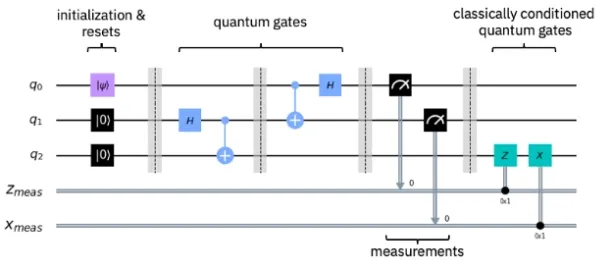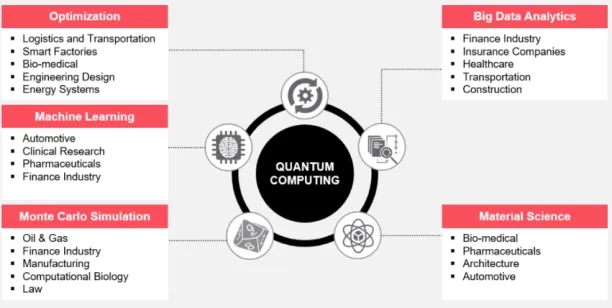Future of Quantum Computing & 7 QC trends in 2024
Quantum computing can be a game-changer in fields such as, cryptography, chemistry, material science, agriculture, and pharmaceuticals once the technology is more mature.
Quantum computing has a dynamic nature, acting as a useful solution for complex mathematical models, such as:
- Encryption methods have been designed to take centuries to solve even for supercomputers. However, these problems could possibly be solved within minutes with quantum computing.
- Even though the modeling of a molecule does not seem to happen in the near future with classical computing, quantum computing can make it possible by solving equations that impede advances in extracting an exact model of molecules. This development has the potential to transform biology, chemistry and material science.
In this article, we explain what quantum computing is, where it can be used, and what challenges might impede its implications.
What is quantum computing?
Wikipedia describes quantum computing as “the use of quantum-mechanical phenomena such as superposition and entanglement to perform computation.”
The quantum computer concept brings a completely different perspective to the classical computer concept. Classical computers work with key-like structures that open and close, which is called bits. However, quantum computers work with interdependent and nonlinear structures called qubits. Feel free to visit our earlier article on quantum computing to learn the basic concepts for qubits and quantum computing.
Shortly, qubits have two different property that is different than the whole concept of classical computing. Entanglement is a property of qubits that allow them to be dependent of each other that a change in the state of one qubit can result and immediate change in others. more than one state during computation. Superposition states that qubits can hold both 0 and 1 state at the same time.
Why is the future of quantum computing important now?
More complex problems are arising
As technology advances, the problems encountered are getting more complex. Quantum computing offers a solution for complex problems like protein modeling. The latest global crisis caused by COVID-19 shows that scientists need a different tool to model a single protein and deactivate it. Another example of an exponential rise in complex problems can be energy usage.
As the human population increases and consumption rate increases exponentially, more complex problems like optimization of sources are arising. Quantum computers can be used to encounter the limitations of complex problems by using the physics of quantum mechanics.
Supercomputers are limited to solving linear problems
Classical computing is a convenient tool for performing sequential operations and storing information. However, it is difficult to find solutions to chaotic problems since it is modeled on the basis of linear mathematics.
Quantum computing seems to be a suitable candidate in solving nonlinear problems as it has nonlinear properties of nature. That being said, quantum computers are not suitable for all kinds of computation.
What are the main trends/subjects for quantum computing?
1- Quantum Annealing
Quantum annealing is already commercially available with today’s technology by D-wave. We already discussed quantum annealing in-depth, don’t hesitate to visit.
2- Quantum Circuits
A quantum circuit consists of quantum gates, initialization & reset structures that enable quantum operations and calculations on quantum data.
A qubit can be thought of as a unit of information and the quantum circuit is the unit of computation. As quantum circuits developed to make quantum calculations become widespread, the power of quantum computing will be reflected in daily life.

3- Quantum Cloud
Cloud-based quantum computing is a method for providing quantum computing by using emulators, simulators or processors through the cloud. Quantum computing systems cover very large volume and operate temperatures at just 15 millidegrees above absolute zero.
Given the difficulty of deploying these systems, it is a necessity with today’s technology to carry out the operations desired to be performed over the cloud. Feel free to read our extended research on cloud-based quantum computing.
4- Quantum Cognition
Quantum cognition aims to model concepts such as the human brain, language, decision making, human memory, and conceptual reasoning by using quantum computing. The quantum cognition is based on various cognitive phenomena defined by the quantum theory of information in order to describe the process of decision making using of quantum probabilities.
5- Quantum Cryptography
Quantum cryptography aims to develop a secure encryption method by taking advantage of quantum mechanical properties. Quantum cryptography aims to make it impossible to decode a message using classical methods. For example, if anyone tries to copy a quantum encoded data, the quantum state is changed while trying to attempt.
6- Quantum Neural Networks(QNN)
QNNs are a combination of classical artificial neural network models with the advantages of quantum computing in order to develop efficient algorithms. QNNs are mostly theoretical proposals without full physical implementation. applications of QNN algorithms can be used in modeling networks, memory devices, and automated control systems.
7- Quantum Optics
Quantum optics is an area that examines the interaction of photons with particles and atoms. Further research on this subject provides a solution to problems encountered in semiconductor technology and communication. In this way, quantum computing can enable further development of classical computers.
What are the possible applications of quantum computing in the future?

Source: Futurebridge
Optimization
Many optimization problems are searching for a global minimal point solution. By using quantum annealing, the optimization problems may be solved earlier than using supercomputers.
Machine Learning / Big data
ML and deep learning researchers are seeking for efficient ways to train and test models using large data set. Quantum computing can help to make the process of training and testing faster.
Simulation
Simulation is a useful tool to anticipate possible errors and take action. Quantum computing methods can be used to simulate complex systems.
Material Science
Chemistry and material science are limited by the calculations of the complex interactions of atomic structures. Quantum solutions are promising a faster way to model these interactions.
There are numerous industry-specific applications of quantum computing in the future. For more information about quantum computing applications, please read our previous research.
What are the key challenges in the future of quantum computing?
Deciding what approach will work
There are different approaches in the implementation of quantum computing. Since quantum computerization and quantum circuits create high investment costs, trial and error of all different approaches will be costly in both time and financial terms. Different approaches for different applications seem to be the most likely solution now.
Currently, some approaches explored by QC companies are analog quantum model, universal quantum gate model and quantum annealing.
- For example, Microsoft’s approach is called topological qubit method under the quantum gate model for mass production of qubits.
- D-wave built the first commercial hardware solution for quantum annealing. Quantum annealing is the most likely approach to be commercialized in the near term for solving complex mathematical problems. Check out our research on how quantum annealing works and how businesses can use it.
Manufacturing stable quantum processors and error correction
In order to take advantage of the properties of quantum mechanics, it is needed to perform manipulations at smaller scales, sometimes smaller than an atom. Small scales cause stability and error verification problems.
Quantum researchers state that error-correction in qubits is more valuable than the total number of qubits obtained. Since qubits cannot be controlled with accuracy, it remains a challenge to solve complex problems.
Maintaining the extreme operating conditions
In order to increase stability and control qubits, IBM keeps temperature so cold (15 milliKelvin) that there is no ambient noise or heat to excite the superconducting qubit. Keeping the temperature so low also creates stability problems in itself. For broad commercialization of a quantum computer or processor, operating conditions should be improved.
Quantum researchers are looking for ways to use quantum processors at higher temperatures. The highest operating temperature has been reached recently. 1 Kelvin, ie -272 degrees, was recorded as the highest operating temperature. However, it seems to take more time to operate these systems at room temperature.
Problems such as stability and error correction are dependent on technology investment, research resources and developments in quantum mechanics. Different organizations are trying to obtain the most accessible quantum computer technology by trying different methods. It will take a while to see which approach will bring success in different areas.
For more on quantum computing
If you are interested in learning more about quantum computing, read:
- Quantum Computing Stats: Forecasts & Facts for 2022 & Beyond
- Guide to Quantum Programming: Languages, SDKs & Algorithms
- State of Quantum Computing in 2022 EOY for Business Leaders
Finally, if you believe your business would benefit from quantum computing, you can check our data-driven lists of:
We will help you choose the best one tailored to your needs:

Cem has been the principal analyst at AIMultiple since 2017. AIMultiple informs hundreds of thousands of businesses (as per similarWeb) including 60% of Fortune 500 every month.
Cem's work has been cited by leading global publications including Business Insider, Forbes, Washington Post, global firms like Deloitte, HPE, NGOs like World Economic Forum and supranational organizations like European Commission. You can see more reputable companies and media that referenced AIMultiple.
Throughout his career, Cem served as a tech consultant, tech buyer and tech entrepreneur. He advised businesses on their enterprise software, automation, cloud, AI / ML and other technology related decisions at McKinsey & Company and Altman Solon for more than a decade. He also published a McKinsey report on digitalization.
He led technology strategy and procurement of a telco while reporting to the CEO. He has also led commercial growth of deep tech company Hypatos that reached a 7 digit annual recurring revenue and a 9 digit valuation from 0 within 2 years. Cem's work in Hypatos was covered by leading technology publications like TechCrunch and Business Insider.
Cem regularly speaks at international technology conferences. He graduated from Bogazici University as a computer engineer and holds an MBA from Columbia Business School.
To stay up-to-date on B2B tech & accelerate your enterprise:
Follow onNext to Read
Quantum Sensors in '24: Best 8 Use Cases & Case Studies
Quantum Software in 2024: What It Is & How It Works
QC Companies of 2024: Guide Based on 4 Ecosystem Maps
In the third section there is the heading:
‘Supercomputer’s are limited to solving nonlinear problem’.
It should read here:
‘Supercomputers are limited to solving linear problem’
Thank you very much indeed! It is corrected now.


Comments
Your email address will not be published. All fields are required.